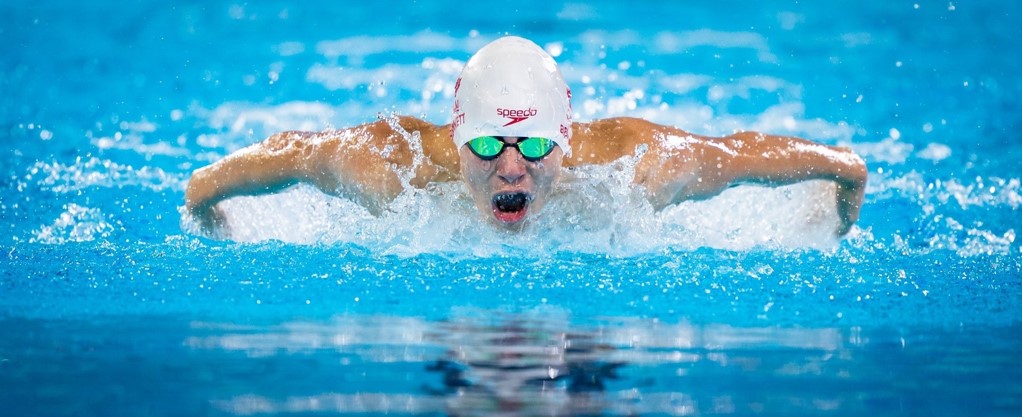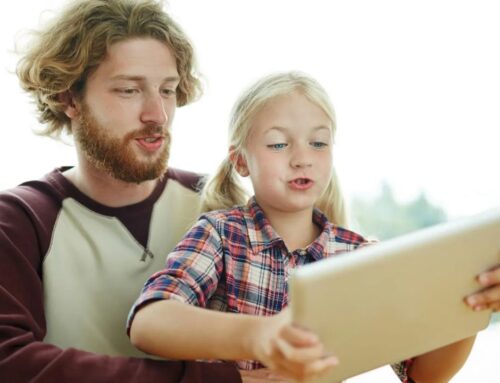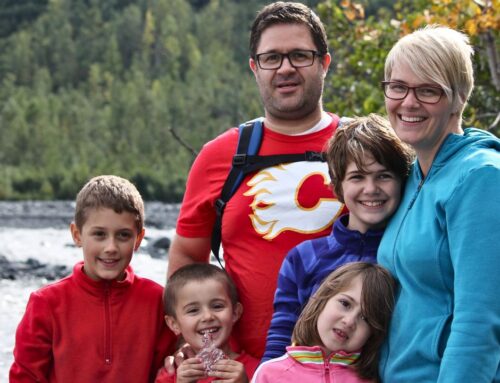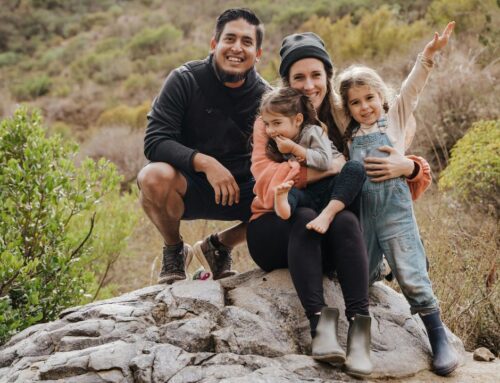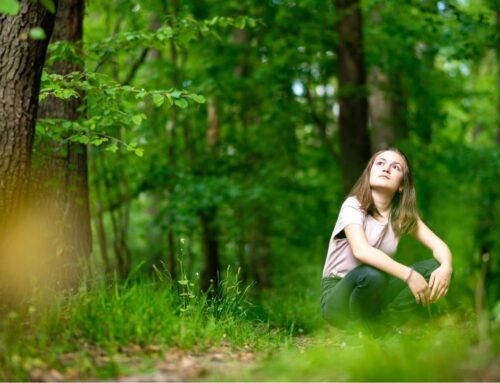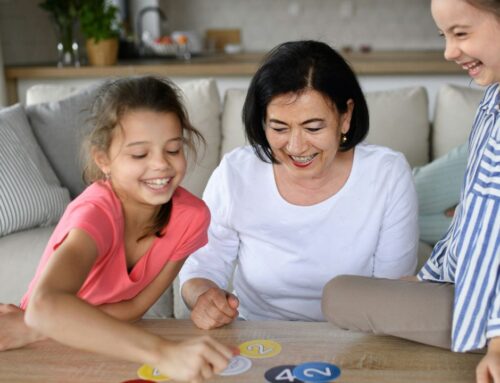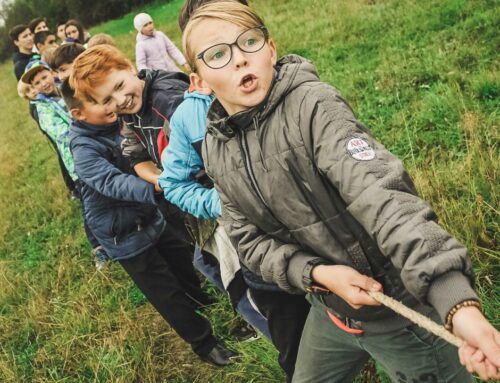On October 30, 2022, 18-year-old Nicholas set a world record in the men’s 200-metre freestyle S14 swimming event at the FINA [International Swimming Federation] World Cup preliminaries in Toronto. Three months earlier, he had set a Commonwealth Games record in the 200-m freestyle S14 Para swimming event in Birmingham, England. Those achievements followed a silver medal in the same event at the World Para Swimming Championships in Madeira, Portugal, in June.
Taking part in international competitions isn’t a new experience for the Parksville, B.C.-based SelfDesign learner. He raced in the Tokyo 2020 Paralympics, coming in among the top five in his event. And in 2019, at the Parapan American Games in Lima, Peru, he medalled four times, including with three gold medals, and lowered several world short-court records in his category.
Nicholas currently swims in the S14 competition category, reserved for swimmers who have an intellectual impairment. Often that means a swimmer has difficulties with pattern recognition, sequencing, and memory, or has slower reaction times — all of which can affect athletic performance.
At age 3, Nicholas was diagnosed with autism spectrum disorder.
The diagnosis led him and his family both to swimming and to SelfDesign® Learning Community.
A combined SelfDesign–swimming journey
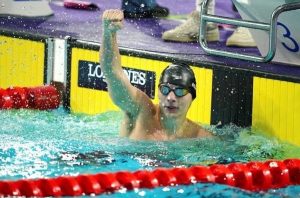 Nicholas started with SelfDesign in grade one. He says his family was trying to find therapy options that worked for him.
Nicholas started with SelfDesign in grade one. He says his family was trying to find therapy options that worked for him.
“We were focusing more on therapy as opposed to academics,” he says.
SelfDesign allowed them to do both — and to succeed at both. Our learner-centred and flexible approach to learning allowed his family to fit his learning around the demands of the therapy he needed and to pace himself. In addition, the support we provide to learners, including to learners who have neurodiverse learning challenges, is tailored to each learner’s individual needs.
“We want every child enrolled with SelfDesign to be successful,” says SelfDesign Support Services team lead Corinne Metcalfe. “We want every child to participate fully in their learning. Our role is to find ways to support and help the learner and the family achieve the child’s learning goals. We focus on where the learner is at, and then we build upon that. We are able to individualize the support we provide, which can be challenging in a public school setting.”
Nicholas’s older sister, Haley, had already joined a swim team, which gave the family some experience with the requirements related to that activity. They decided to see if water therapy and swimming lessons would help Nicholas.
“We tried it out. At seven years old, I seemed to really like it,” Nicholas says. Equally importantly, the family also found that “when I was swimming, I seem to be able to unlock finer motor control and also a higher level of language.”
Nicholas started swimming competitively around age 10. Five years later, he made the national team for the first time.
Again, he was following in the wake of sister Haley, who swam competitively until 2018. Now, she is the head coach at Parksville’s Ravensong Aquatic Club, where Nicholas trains for part of the year.
She’s also Nicholas’s main coach.
“I think making the national team at that point just caused everything to skyrocket in my career,” Nicholas says. “And also, like, my training — of course, videos are the only way I can remember that from before — it was kiddie-ish beforehand, but now it’s a lot more serious. My sister, this year alone, has just stepped everything up intensity-wise. It’s tough, but it’s rewarding.”
When Nicholas made the national team three years ago, SelfDesign’s flexibility continued to work in his favour. Nicholas, who attained his Dogwood Diploma in January, was able to arrange his schedule to give his learning, his training and his competitions the time, attention and focus each required when they required it.
“I can see with a couple of my training partners,” he says, “they have assignments, they’ve got homework, and then they swim. They don’t have a lot of time to do that. But I have the flexibility to fully recover after everything, and still do schoolwork.”
Nicholas usually has 11 blocks of training each week, with three one-hour sessions in the gym and eight 1.5- to 2-hour sessions in the water. On average, he trains for about 10 or 11 hours every week.
Before he finished grade 12, he would schedule his meetings with his learning consultant, his learning specialists and his tutors and his real-time gatherings around his training.
“I’d do a morning [training] session, lay down for a couple hours, wake up, work with my learning consultant for an hour or two, then go to training,” he says. “Or I’d do some schoolwork before doing gym. I do some work at nights, too — like, it’s work, swimming, gymming, then school.”
And when he travelled for competitions, he could adjust his hours to avoid getting behind on schoolwork.
“I wouldn’t have to double up or triple up so I didn’t miss, like, a whole month of schooling opportunities like that. It has afforded me the ability to travel for my career and also do school at the same time.”
Out of the pool
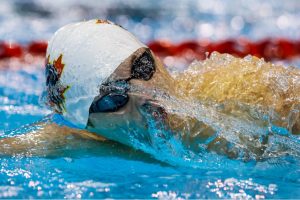 Nicholas, competitive swimmer, Commonwealth medallist, and world record holder several times over is as multifaceted and dynamic as any young person finishing high school and starting the next phase of his life.
Nicholas, competitive swimmer, Commonwealth medallist, and world record holder several times over is as multifaceted and dynamic as any young person finishing high school and starting the next phase of his life.
As a self-confessed nerd, Nicholas plays Dungeons & Dragons, a role-playing table-top game (referred to as “D&D” by its fans) that is very popular among gamers and fantasy enthusiasts, and geeks out on science fiction.
He also really enjoys photography and writing, both activities he explored in the themes and courses SelfDesign offers to learners in grade 10 to 12.
“I like to write about things I find interesting and I want to delve deeper into,” he says. In addition to exploring new topics of interest, he uses his writing to support his D&D hobby, helping him to build new D&D worlds and the rules that apply to those worlds.
“I’m able to express my thoughts more clearly on paper,” he says.
He uses photography to further his interest in history.
“It’s just like a gateway into the past,” he says of taking pictures of things that are older. “It’s like an art form where you don’t have to pick up a brush or a pencil — you just need a device that can do it. And then it’s up to the person and what they want to do. It’s the freedom of being able to take a picture or take what they want, but also they can frame it in any way they want.”
What competing at the Paralympics and Commonwealth Games was like
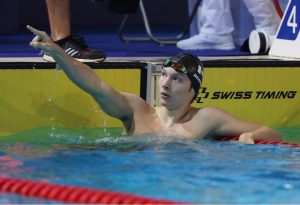 The 2020 Tokyo Paralympics, which took place in 2021 because of the pandemic, were a strange experience, Nicholas says.
The 2020 Tokyo Paralympics, which took place in 2021 because of the pandemic, were a strange experience, Nicholas says.
“It was a year after COVID hit. There were no spectators at all, so you could hear a pin drop in the stadium, that kind of thing. And also the training leading up to that — we weren’t quarantined into an area, but we were in this little area…. So that was the competition part,” he says.
“It was something entirely new to me. It was stressful, but it’s also the most exciting part of the training I’ve ever had — just being able to show I’m actually capable of racing with the fastest people in the world in my class.”
Last year’s Commonwealth Games were an entirely different experience for the swimmer. Unlike at the Olympics and Paralympics, which are separate events scheduled at very different times, both able-bodied and disabled athletes compete together during the Commonwealth Games. And, of course, spectators were allowed at the Birmingham Commonwealth Games.
“It was probably the busiest stadium I’ve ever seen — there were probably, like, 2,000 people in the stands,’ Nicholas says. “It was — well, it was amazing. To be honest, I’ve never seen such high turnout for sports like that. But also being able to see the able-bodied guys in action racing on the side of the pool — it’s a completely different thing than watching them on TV or on your phone.”
And the training experience was very different, too.
“I got to train with, like, the legends of Canada — Maggie MacNeil, Summer Macintosh, Josh Liendo — like these guys, who are top of the world, medalling at the Olympics,” Nicholas says. “And those guys are sitting beside me? I got a little giddy, just actually being able to sit at the same table and talk with them.”
What’s next for Nicholas
After he finished his SelfDesign journey at the end of January, Nicholas left for Australia to take part in a swimming and training camp. With more competitions scheduled, his goal is to keep training and climbing the ladder of elite competitive swimming for another decade or so.
“My goal has always been to swim on the national team, but right now, I think I’m trying to get to the Olympic side, not just the Paralympics,” he says. “I just want to make sure people who are like me, with my autism diagnosis, can be represented on the table, side by side, too.”
Eventually, he sees himself getting his coaching certificate and helping younger swimmers reach their potential, as sister Haley has done. He’s also looking at going to college to study history.
Learn more about how we support children with learning challenges to reach their potential
Read about some of our other learners’ SelfDesign journeys
Learn more about paths to graduation at SelfDesign
Read about how our learners can participate on school sports teams

